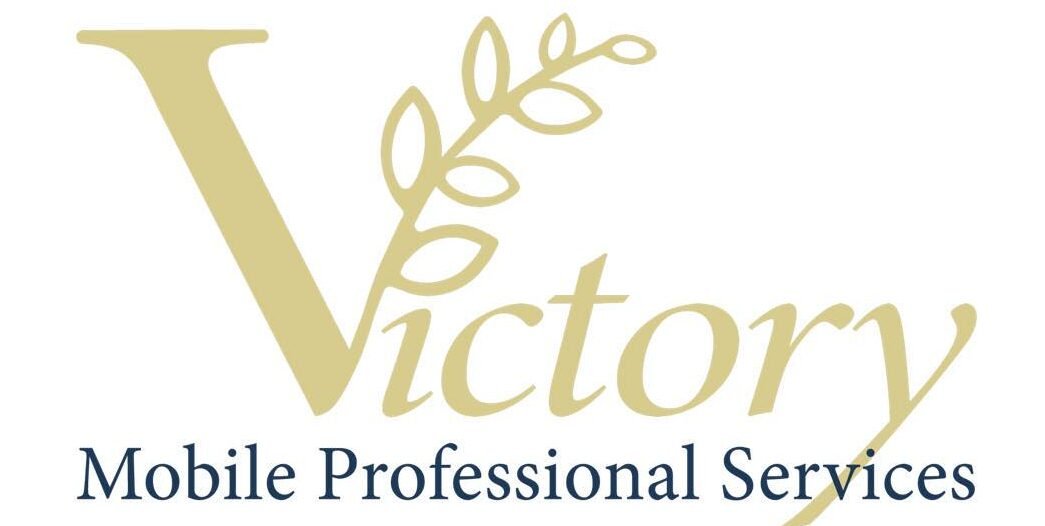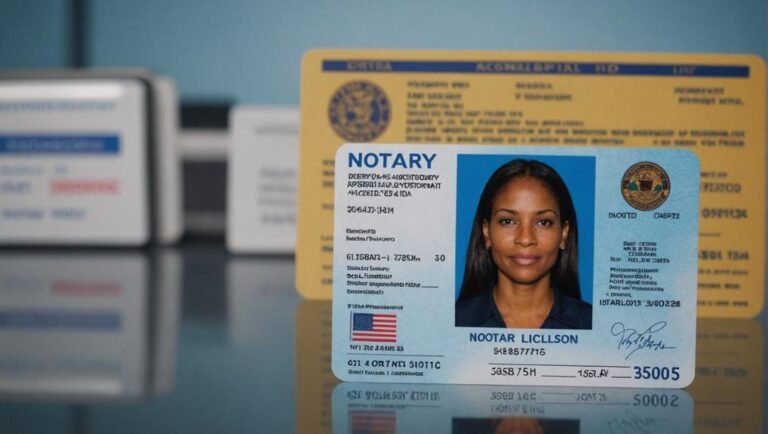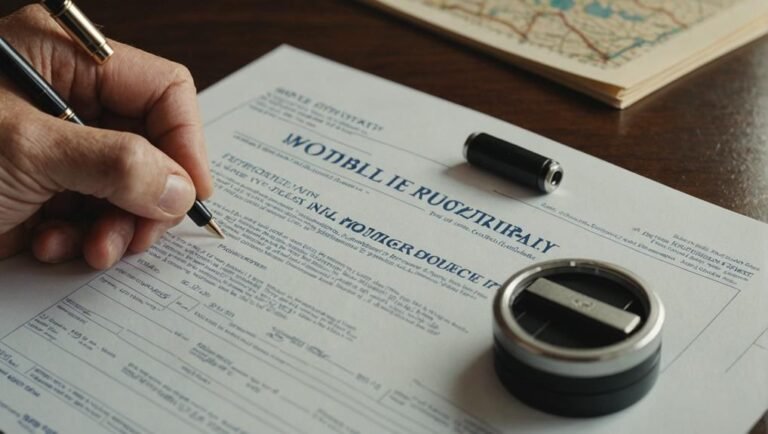To grasp the new Florida notary rules, take note of the remote notarization allowance since January 1, 2020. Complete the mandatory two-hour training for this. Maintain a $25,000 bond and errors & omissions insurance. Follow Florida statute §117.05 rigorously. Fulfill specific technology requirements. All documents and affidavits necessitate revisions effective from January 1, 2020. Lack of updated language risks rejection. Guarantee prompt action for compliance. New statutory acknowledgment wording is essential for post-January 1, 2020, documents. Utilize the updated form for proper recording. For further information on key updates, seek advice from specialists in real estate and finance matters.
Key Takeaways
- Mandatory two-hour training course for remote notarization.
- New statutory acknowledgment wording required for all notarized forms.
- Revised notary block form mandatory for documents signed post-January 1, 2020.
- Compliance with Florida Statute §117.05 essential for notarization.
- Contact attorneys for guidance on real estate and financial matters.
Remote Notarization Requirements
To conduct remote notarization in Florida, notaries must adhere to specific requirements outlined by state law.
Remote notarization became permissible in Florida as of January 1, 2020, necessitating notaries to complete a mandatory two-hour training course specific to remote notarization.
Additionally, notaries must post a $25,000 bond and acquire $25,000 errors and omissions insurance to partake in remote notarization activities.
Ensuring compliance with Florida Statute §117.05 is essential for notaries engaging in remote notarization within the state.
Furthermore, specific technology requirements must be met to facilitate remote notarization procedures efficiently and securely.
Changes to Notary Block Form
Amendments to the notary block form in Florida require immediate attention from notaries statewide. The new notary laws necessitate revisions to the form, with new language being a necessity for all documents signed on or after January 1, 2020. Not utilizing the updated notary block language could result in rejection, making it essential for notaries to act promptly to guarantee compliance. Failure to adopt the new required notary block form for documents post-January 1, 2020, may trigger potential recording issues, highlighting the significance of this update.
To better understand the changes to the notary block form, let's explore a detailed breakdown in the table below:
| Aspect | Details | Importance |
|---|---|---|
| Form Revisions | Mandatory for all documents and affidavits | Compliance |
| Effective Date | Applicable to instruments signed from Jan 1, 2020 | Timeliness |
| Risk of Rejection | Documents lacking updated language might be rejected | Adherence to new rules |
| Consequences | Potential recording issues if new form not utilized | Legal compliance |
Statutory Acknowledgment Language
Ensuring compliance with the new statutory acknowledgment wording is vital for notaries in Florida. The updated acknowledgment wording is a critical component that must be included in all notarized forms for individuals.
Whether the acknowledgment is conducted through physical presence or online notarization methods, the new wording requirements apply.
Notarized documents signed on or after January 1 must utilize the new form containing the updated acknowledgment wording. However, documents signed on the old form before January 1 are acceptable as long as they're recorded after that date.
It's essential for notaries in Florida to familiarize themselves with the new form and guarantee that all notarized documents adhere to the updated statutory acknowledgment wording.
Recording Issues
The accurate recording of documents is an essential aspect of notarial duties in Florida. To prevent complications, it's vital to use the correct notary block form based on the date of signing.
Documents signed before January 1, 2020, should utilize the old notary block form, while those signed on or after that date must use the updated version. Adhering to the revised notary block form helps in ensuring proper document recording and reduces the likelihood of issues arising during the process.
It's advisable to start implementing the new notary block form immediately to align with the current regulations and avoid any potential recording problems.
Contact Information for Inquiries
For inquiries concerning real estate and financial matters, the attorneys to contact are Rob Freedman, Jourdan Haynes, or Vinnie Vaughn. These attorneys specialize in providing assistance with real estate transactions, title insurance, banking issues, and business transactions related to finance in Florida.
If you have questions or need guidance on real estate transactions or financial regulations in the state, reaching out to any of these attorneys can offer valuable insights.
Rob Freedman, Jourdan Haynes, and Vinnie Vaughn are well-versed in the Florida notary rules and can provide detailed information to address your inquiries effectively.
Whether you need clarification on specific rules, assistance with understanding legal documents, or guidance on maneuvering through complex real estate regulations, these attorneys are equipped to help.
Contact information for these attorneys can be obtained through the firm's website or by reaching out directly to their offices.
Don't hesitate to seek their expertise for any real estate or financial matters you may encounter in Florida.
Rule Summary
Implementing the new rule in Florida concerning notification changes for Online Notaries Public and remote online notarization service providers is crucial for compliance with regulatory requirements. The addition of Section 7.005 to Chapter 1N-7 of the Florida Administrative Code brings significant changes regarding Online Notary Information and Status Changes.
Online Notaries are now mandated to provide service provider details within 30 days of the rule's effective date. Additionally, the registration process for Online Notary Public now requires the provision of detailed service provider information.
These alterations aim to improve transparency and accountability within the domain of online notarization in Florida. By ensuring that Online Notaries disclose their service provider details promptly, the regulatory framework seeks to strengthen trust and reliability in remote online notarization processes.
Adhering to these updated notary rules is essential for both Online Notaries Public and remote online notarization service providers to operate lawfully and uphold the integrity of the notarization process in the state of Florida.
Changes for Online Notaries
To comply with Florida's updated notary rules, Online Notaries must promptly report any changes in service providers to the Department of State within 30 days.
When registering as an Online Notary Public, individuals are required to furnish details of their service providers. Amendments to Form DS-DOC-50 are necessary for any modifications in service providers by Online Notaries offering online notarization services. These requirements encompass changes, additions, or removals of service providers.
It's vital for Online Notaries to provide information regarding secure repository delegation when submitting self-certification to the Department of State. Ensuring compliance with these regulations is essential for Online Notaries to maintain the integrity and security of online notarization services.
Remote Online Notarization Service Providers
Remote Online Notarization Service Providers in Florida must ensure annual certification of their technology and services' compliance with state requirements. As per state regulations, these providers are obligated to self-certify their compliance for a one-year period.
When filing their self-certification with the Florida Department of State, service providers must specify secure repositories. If providers delegate duties to a secure repository, amendments to Form DS-DOC-51 are essential.
Additionally, new providers looking to offer remote online notarization services in Florida must submit all required information before commencing operations. By adhering to these requirements and procedures, remote online notarization service providers guarantee that they're in line with the latest regulations and standards set forth by the state.
Analysis of the Rule
The Florida Department of State's new rule on notification changes for Online Notaries Public and remote online notarization service providers significantly impacts the transparency and accountability of online notarization services.
This rule, adding Section 7.005 to Chapter 1N-7 of the Florida Administrative Code, focuses on Online Notary Information and Status Changes. Online Notaries are now mandated to report any service provider changes within 30 days of the rule's effective date. Additionally, providers of remote online notarization services must annually certify that their technology and services align with state requirements.
By implementing these requirements, the aim is to enhance transparency and accountability within the online notarization industry. The publication of lists containing information about Online Notaries, service providers, and secure repositories is an essential aspect of achieving this goal.
Adhering to these new regulations guarantees a more secure and reliable online notarization process for all parties involved.
Frequently Asked Questions
Can I Notarize a Document Without the Person Present in Florida?
You can notarize a document without the person present in Florida through remote notarization. Online platforms facilitate this process by verifying identity, ensuring legal compliance, and preventing fraud. State regulations and technology advancements support electronic signatures.
What Are the Requirements to Notarize a Document in Florida?
To notarize a document in Florida, you must adhere to strict requirements: complete training, verify IDs, use proper notary stamp, follow remote notarization rules, bond and insure, maintain records, renew, and comply with fee regulations.
Are Florida Notaries Required to Keep a Log?
You aren't required to keep a log as a Florida notary, but maintaining a record of your notarial acts is wise. It's your responsibility to track activities, verify IDs, and uphold ethics.
How Much Can a Notary Charge per Signature in Florida?
You can charge a maximum of $10 per signature in Florida for notarizing documents. It's important to follow the fee limits, verify identities, and keep records. Remote notarization, electronic signatures, and specific services are authorized with proper training.
Conclusion
To sum up, the new Florida notary rules have streamlined the process for remote notarization and updated requirements for notary block forms.
For example, a real estate closing conducted entirely online with a remote notary, ensuring a smooth and efficient transaction.
These changes reflect the evolving landscape of technology and provide clearer guidelines for notaries to follow in order to protect the integrity of the notarization process.






